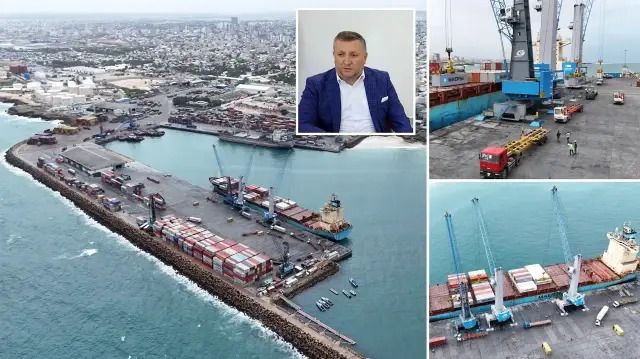Albayrak Group’s investments anchor Somalia’s recovery

The Chairman of the Foreign Economic Relations Board (DEİK) Somalia Business Council and the Somali Representative of Albayrak Group, Ahmet Sami İşler, along with the Director of Mogadishu Port, Umut Yurdakul, shared their assessments on the company’s activities and the strategic importance of the port.
İşler recalled that Albayrak Group entered Somalia following President Recep Tayyip Erdoğan’s historic visit to the country in 2011. He emphasized that their initial goal was humanitarian.
“At that time, Somalia was in a very difficult situation, facing a crisis due to drought. We said, let us not work only for short-term relief, but let’s create something permanent,” İşler explained.
He noted that the group began restoration work at Mogadishu Port, the country’s main gateway. “We have been operating this port for about eleven years now. We have invested in every way possible. We believe we have made a strong contribution to the state. We are satisfied with Somalia, and hopefully Somalia is satisfied with us. We have become closely identified with the country,” he said.
İşler also recalled that in 2012 the group rebuilt a collapsed hospital, transforming it into the Recep Tayyip Erdoğan Training and Research Hospital, one of Africa’s largest and most advanced. The hospital was inaugurated in 2015 with the presence of President Erdoğan.
He added that Albayrak Group was honored to construct Türkiye’s largest embassy complex abroad, the Turkish Embassy in Mogadishu, which began in 2014 and was completed in 2016. The company has also undertaken the construction of the Somali Presidential Complex. “We did everything possible to contribute to this project, building it for the President, the Somali state, and its people,” İşler stressed.
Highlighting the importance of Mogadishu Port as the country’s trade lifeline, İşler stated that about 70 percent of Somalia’s imports now come from Türkiye, whereas in the past goods had been sourced largely from China and the United Arab Emirates. The trade volume between Türkiye and Somalia has reached half a billion dollars, he said, with the aim of further growth.
However, İşler pointed to difficulties with visas and residence permits. “If these problems are not resolved, we risk losing our commercial gains over time. Serious responsibilities fall on our leaders, political representatives, ministers, and embassies to address this,” he noted, adding that Somalis also face similar challenges in Türkiye.
Acknowledging Somalia’s security issues, İşler remarked that opportunities come with risks: “Where there is risk, there is also potential. For those who know how to take risks, there are great opportunities here.”
Addressing global business leaders, İşler urged: “Everything comes from outside. There are no factories here, no investments, no tourism. To revive these sectors, entrepreneurs are needed. Somalis expect this from us. We tell Turkish businesspeople: ‘Come to Somalia, see it for yourself. If you are willing to take risks, opportunities await.’”
Mogadishu Port Director Umut Yurdakul underlined that this is the capital’s only and largest entry port. With almost no domestic production, nearly all of Somalia’s needs pass through the port. He noted that Turkish products have declined somewhat in recent years due to shifting global logistics routes and wars, yet Türkiye remains Somalia’s largest supplier, alongside imports from India, China, and the Middle East.
He added that goods also reach Somalia through neighboring Kenya via transit trade. Construction of Mogadishu Port began in 1973 and continued in stages until 1983. However, it was closed from 1991, when civil war broke out, until 2006. “During that period, Somalis were cut off from both goods and developments around the world,” Yurdakul explained.
Later, measures were taken to boost trade and improve living conditions. “The most important of these measures was this port. It was essential for humanitarian aid to reach Somalia and for trade to continue,” Yurdakul stressed.
He recalled that Albayrak Group took over management and modernization of the port through a concession agreement signed at the end of 2014. “With our work, we have tried to bring the port to international standards. Today, we provide services at that level. Once this was proven, global companies embraced this port. In a sense, Somalia reopened to the world thanks to this port,” he said.
Yurdakul also emphasized the country’s weak road and rail links, underscoring that Mogadishu Port remains the only point capable of sustaining the entire nation. Somalia’s 3,300 kilometers of coastline hosts scattered settlements, with small local ports serving some areas, but none match Mogadishu’s capacity. Even in Somaliland, the large port on the Gulf of Aden does not rival Mogadishu’s scale.
“Products entering here are distributed all across the country. Our port also serves as a collection hub,” Yurdakul explained. The port spans 350,000 square meters and is served by three of the world’s largest container lines.
He concluded by noting that all foodstuffs, as well as cement and steel used in Somalia’s reconstruction, pass through Mogadishu Port. “It is truly the country’s lifeline,” Yurdakul said.
Here we are to serve you with news right now. It does not cost much, but worth your attention.
Choose to support open, independent, quality journalism and subscribe on a monthly basis.
By subscribing to our online newspaper, you can have full digital access to all news, analysis, and much more.
You can also follow AzerNEWS on Twitter @AzerNewsAz or Facebook @AzerNewsNewspaper
Thank you!
